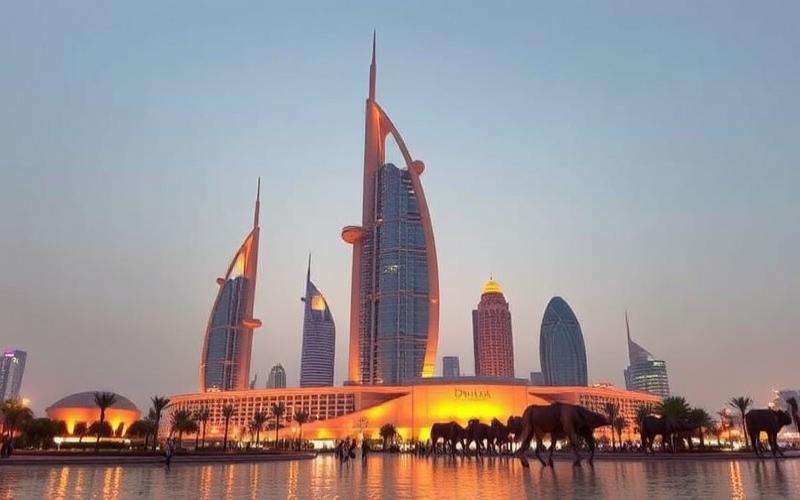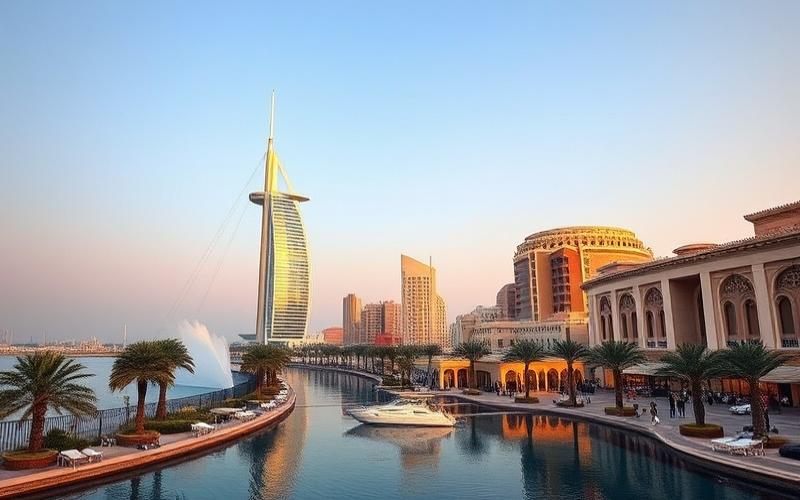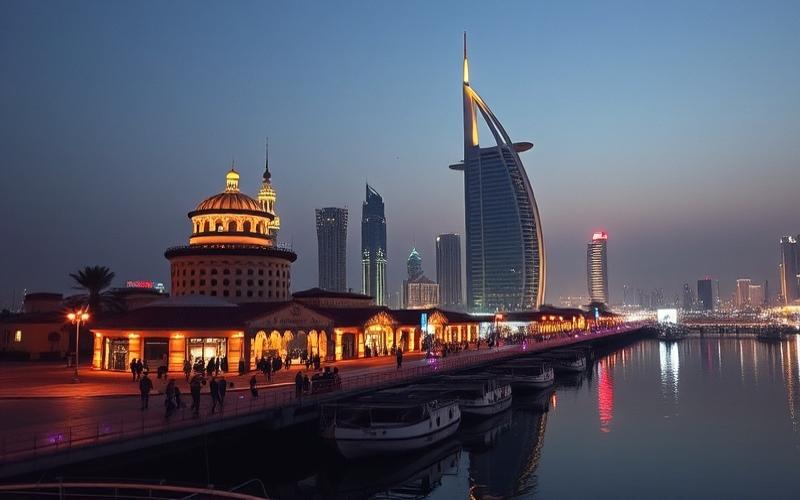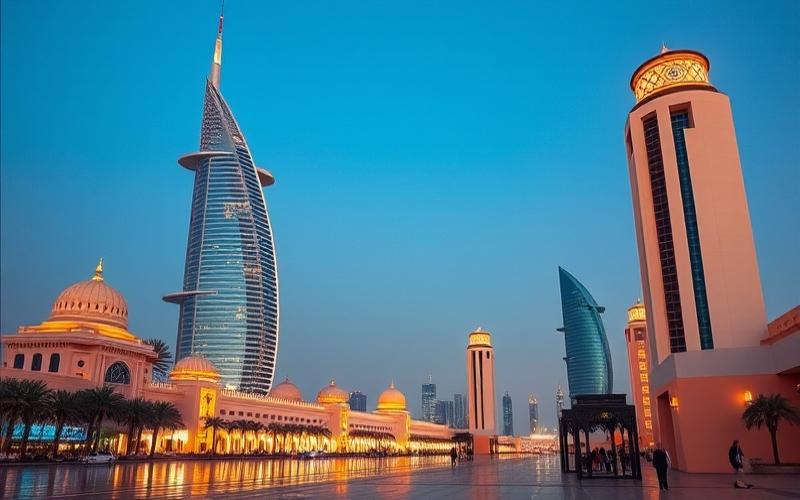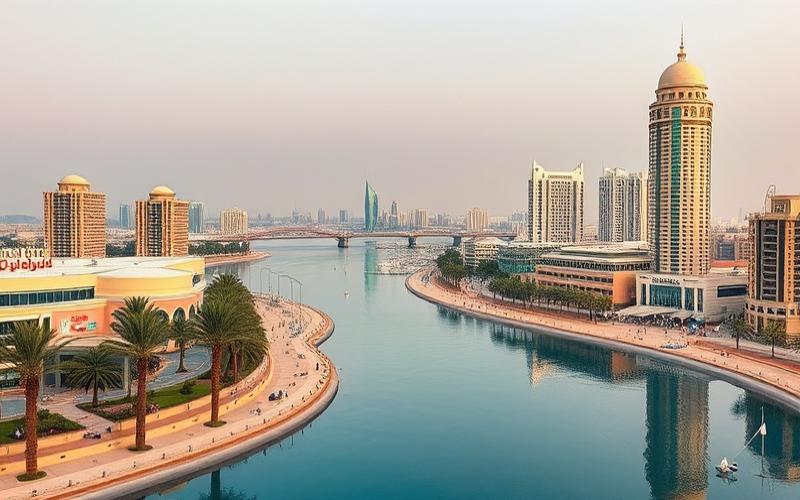
 Published on and written by Cyril Jarnias
Published on and written by Cyril Jarnias
Dubai, the jewel of the United Arab Emirates, is attracting an increasing number of real estate investors from around the world. And for good reason: this city-state offers a particularly advantageous tax environment, combined with a dynamic real estate market and attractive return opportunities. Let’s dive into the details of what makes Dubai a prime destination for real estate investors seeking tax optimization.
A Tax Haven in the Heart of the Middle East
Dubai stands out for its extremely light taxation, or even non-existent in many areas. This attractive tax policy is a cornerstone of the emirate’s economic development strategy, aimed at attracting foreign investors and diversifying its economy beyond the oil sector.
The absence of income tax is undoubtedly the most significant advantage for real estate investors. Whether you are a resident or non-resident, the rental income you generate in Dubai is not subject to any local taxation. This feature allows investors to keep all of their rental income, offering significantly higher profitability prospects than many other countries.
Furthermore, Dubai does not levy capital gains tax on real estate. Thus, if you decide to resell your property, the profit made will not be taxed locally. This absence of capital gains taxation encourages fluidity in the real estate market and allows investors to fully capitalize on the appreciation of their properties.
Good to know:
In Dubai, your rental income and real estate capital gains are not taxed locally, which maximizes your profitability and return on investment.
Advantageous International Taxation
Dubai’s tax appeal is not limited to its local policy. The emirate has concluded numerous international tax treaties, including double taxation avoidance agreements with over 100 countries. These agreements aim to prevent income generated in Dubai from being taxed twice: once in Dubai (where they generally are not) and once in the investor’s country of tax residence.
For French investors, for example, the tax treaty between France and the United Arab Emirates stipulates that real estate income is taxable in the state where the properties are located. Concretely, this means that rental income generated by a property in Dubai will not be taxed in France. However, it is important to note that this income must be declared in France and may be taken into account for calculating the effective tax rate on your other income.
This advantageous tax situation also applies to real estate capital gains. According to the tax treaty, capital gains realized from the sale of a property located in Dubai are taxable only in the United Arab Emirates. Given that Dubai does not tax these capital gains, the investor can potentially realize a tax-free capital gain.
Good to know:
Dubai’s international tax treaties can help you avoid double taxation on your real estate income, thus optimizing your overall investment strategy.
Minimal Property Charges
Unlike many countries where property owners face significant property and occupancy taxes, Dubai stands out for the absence of such recurring charges. This particularity significantly contributes to the profitability of real estate investments in the emirate.
There is no annual property tax in Dubai. Therefore, owners do not have to bear this cost, which can represent a significant expense in other countries. This absence of property tax allows investors to retain a larger portion of their rental income and helps maintain low holding costs for owner-occupiers.
Similarly, the occupancy tax, as it exists in many European countries, is non-existent in Dubai. Occupants, whether owners or tenants, do not have to pay this annual tax. This situation is particularly advantageous for investors who wish to offer properties for rent, as it allows for maintaining attractive rents while preserving the investment’s profitability.
It should be noted, however, that Dubai applies a one-time tax when purchasing a property. This tax, called a “transfer fee,” amounts to 4% of the property’s value and is generally shared between the buyer and seller. Although not negligible, this tax remains moderate compared to transfer duties and other acquisition fees in force in many countries.
Good to know:
The absence of property tax and occupancy tax in Dubai significantly reduces the holding costs of real estate properties, thus improving the net profitability of your investments.
Dubai vs. The World: An Enlightening Comparison
To better appreciate Dubai’s tax attractiveness for real estate investors, it is instructive to compare its situation with other popular destinations for international real estate investment.
France: In France, rental income is subject to income tax (with progressive rates that can reach 45%) or the flat-rate withholding tax of 30%. Real estate capital gains are taxed at 19%, plus social contributions of 17.2%. Additionally, owners must pay property tax and, for secondary residences, occupancy tax.
United Kingdom: Rental income is taxed according to a progressive scale that can go up to 45%. Real estate capital gains are taxed at 18% or 28% depending on the taxpayer’s tax bracket. The UK also applies an annual property tax (council tax) whose amount varies by locality.
United States: Real estate taxation varies by state, but generally, rental income is subject to federal income tax (with rates up to 37%) and often an additional state tax. Real estate capital gains are taxed at preferential rates but remain significant. Moreover, most localities levy substantial annual property taxes.
Singapore: Although considered an attractive financial center, Singapore taxes rental income at progressive rates that can reach 22%. Real estate capital gains are generally not taxed, but there is an annual property tax and high stamp duties upon purchase.
In comparison, Dubai stands out clearly by the total absence of taxation on rental income and capital gains, as well as the non-existence of recurring property taxes. This exceptional tax situation places Dubai in a very advantageous position for real estate investors seeking tax optimization.
- No tax on rental income
- No tax on real estate capital gains
- No annual property tax
- No occupancy tax
- Advantageous tax treaties with many countries
Good to know:
Compared to other popular real estate investment destinations, Dubai offers a significantly more advantageous tax environment, thus maximizing the profitability potential of your investments.
Optimization Strategies for Savvy Investors
To fully benefit from the tax advantages offered by Dubai, real estate investors can adopt several optimization strategies:
1. Investment Structuring: Although purchasing in one’s own name is simple and tax-advantageous in Dubai, some investors opt to create an offshore or onshore company to hold their real estate properties. This approach can offer additional flexibility in terms of wealth management and estate planning.
2. Portfolio Diversification: Dubai offers a variety of real estate investment options, from luxury apartments to villas and commercial properties. Diversifying your portfolio can allow you to maximize your returns while spreading risks.
3. Short-Term Rental: Unlike many cities that restrict short-term rentals, Dubai offers a regulatory framework favorable to this practice. Income generated by short-term rentals can be significantly higher than that of traditional rentals, while benefiting from the same tax exemption.
4. Reinvestment of Profits: The absence of taxation on rental income and capital gains allows investors to quickly reinvest their profits, thus accelerating the growth of their real estate portfolio.
5. Tax Residence Planning: For some investors, it may be advantageous to consider changing their tax residence to Dubai. This requires careful planning and should be considered within the framework of an overall wealth management strategy.
Good to know:
A well-thought-out investment strategy, combining diversification, tax optimization, and active management, can significantly amplify the already substantial tax benefits offered by Dubai.
Prospects and Developments in the Dubai Real Estate Market
The Dubai real estate market, known for its volatility, has shown remarkable resilience in recent years. After a period of correction, prices and rents have resumed an upward trajectory, stimulated by economic reforms, continued diversification of the economy, and government initiatives aimed at attracting international investors and talent.
Expo 2020 (postponed to 2021-2022 due to the pandemic) marked a turning point for Dubai’s real estate market. The event not only stimulated short-term demand but also helped strengthen Dubai’s position as a global hub for business and innovation, with positive long-term spillovers for the real estate market.
The prospects for the coming years remain positive, with several factors supporting market growth:
- Continued economic diversification, reducing dependence on oil
- Massive investments in infrastructure and urban development projects
- Government policies favorable to foreign investors, including long-term visas for real estate investors
- Sustained population growth, fueled by immigration of qualified professionals
- Tourism development, with a target of 25 million annual visitors by 2025
These factors, combined with Dubai’s exceptional tax environment, continue to position the emirate as a prime destination for international real estate investors seeking attractive returns and advantageous taxation.
Good to know:
The Dubai real estate market, supported by strong fundamentals and favorable government initiatives, offers promising prospects for medium and long-term investors.
Disclaimer: The information provided on this website is for informational purposes only and does not constitute financial, legal, or professional advice. We encourage you to consult qualified experts before making any investment, real estate, or expatriation decisions. Although we strive to maintain up-to-date and accurate information, we do not guarantee the completeness, accuracy, or timeliness of the proposed content. As investment and expatriation involve risks, we disclaim any liability for potential losses or damages arising from the use of this site. Your use of this site confirms your acceptance of these terms and your understanding of the associated risks.





